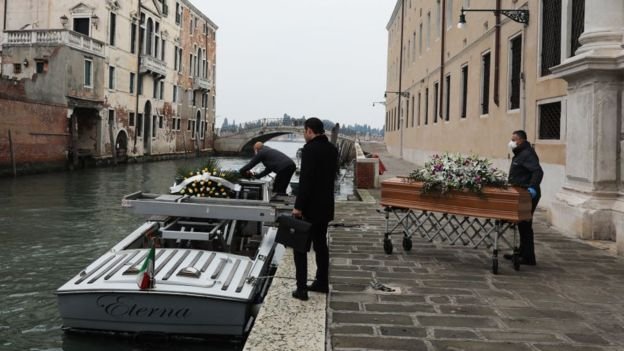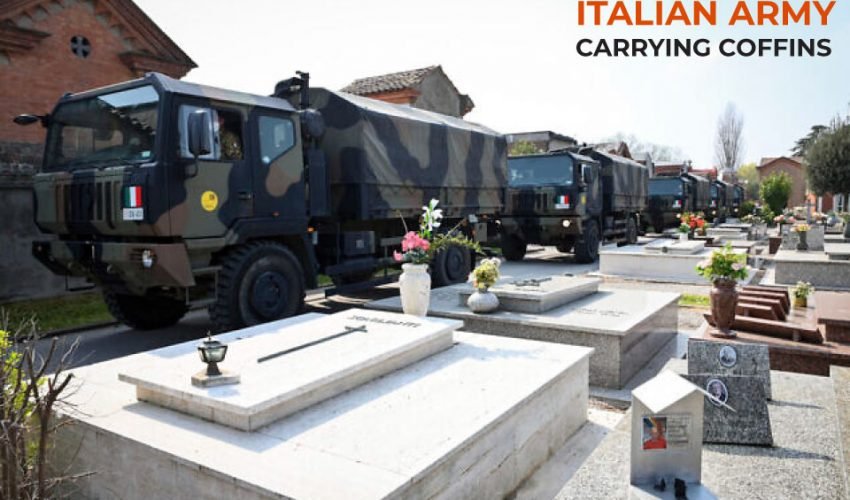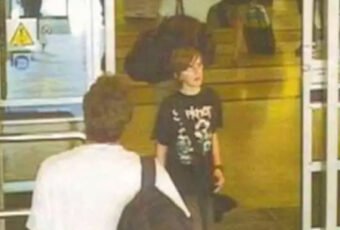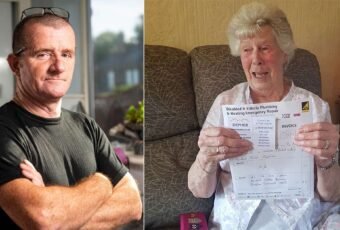People of Italy have been banned from attending funerals because of the coronavirus pandemic, the virus that took away the dignity from the deads by robbing the chances of a final goodbye from families of those who died in coronavirus crisis.
“First it isolates you from your loved ones, right before you die, then it doesn’t allow anyone to get closure, the pandemic kills you twice”, says Andrea Cerato, a worker in the funeral home in Milan.
“Families are devastated and find it hard to accept.”
A number of people died in Coronavirus pandemic in Italy and most of them dying in hospital isolation without any family or friends. Hospital visits are also banned since the risk of contagion is too high there.
While health authorities say the virus cannot be transmitted posthumously, it can still survive on clothes for a few hours. This means corpses are being sealed away immediately.

“So many families ask us if they can see the body one last time. But it’s forbidden,” says Massimo Mancastroppa, an undertaker in Cremona.
The dead cannot be buried in their finest and favorite clothes. Instead, it is the grim anonymity of a hospital gown.
“We put the clothes the family gives us on top of the corpse as if they were dressed,” he says. “A shirt on top, a skirt below.”
In this unprecedented situation, undertakers are suddenly finding themselves acting as replacement families, replacement friends, even replacement priests.
People close to those who die from the virus will often be in quarantine themselves.
“We take on all responsibility for them,” says Andrea. “We send the loved ones a photo of the coffin that will be used, we then pick up the corpse from the hospital and we bury it or cremate it. They have no choice but to trust us.”
The hardest thing for Andrea is not being able to ease the suffering of the bereaved. Instead of telling families all the things he can do, he is now forced to list everything he is no longer allowed to do.
“We can’t dress them up, we can’t brush their hair, we can’t put makeup on them. We can’t make them look nice and peaceful. It is very sad.”
Andrea has been an undertaker for 30 years, just like his father before him. He says small things are usually important for the bereaved.
“Caressing their cheek one last time, holding their hand, and seeing them look dignified. Not being able to do that is so traumatic.”
In this time of virus, undertakers are often forced to meet grieving families either side of a closed door.
Relatives still try to pass on handwritten notes, family heirlooms, drawings and poems in the hope they will be buried alongside their mother or father, brother or sister, son or daughter.
Burying personal items is now illegal. A drastic measure but one designed to stop the spread of the disease.
If someone dies at home, undertakers are still allowed inside – but they have to come in wearing full protective gear: glasses, masks, gloves, coats. It is a deeply distressing sight for someone who’s just seen a loved one die.
But many undertakers are now in quarantine themselves. Some have had to close their business. A big worry is that those who handle the dead don’t have sufficient masks or gloves.
At least once a day, Andrea buries a body and not even one person shows up to say goodbye – because everyone is in quarantine.
“One or two people are allowed to be there during burial, but that’s all,” Massimo says. “No-one feels able to say a few words, and so it is just silence.”
Whenever he can, he tries to avoid that. So he drives to a church with the coffin in the car, opens the boot, and asks a priest to perform a blessing there and then.
It is often done in seconds. And then the next person awaits.
Italy’s mortuary industry is overwhelmed and the number of dead keeps rising. Almost 7,000 people have been killed by the virus so far (24 March) – more than any other country in the world.
“There’s a queue outside our funeral home in Cremona,” says Andrea. “It’s almost like a supermarket.”
Hospital morgues in northern Italy are inundated.
“The chapel at the hospital in Cremona looks more like a warehouse,” says Massimo.

Caskets are piling up in churches. In Bergamo, which has the highest number of cases in Italy, the military has had to step in because the city’s cemeteries are now full.
One night last week, locals watched in silence as a convoy of army trucks slowly drove more than 70 coffins through the streets.
Each one contained the body of a friend or neighbor being taken to a nearby city to be cremated. Few images have been more shocking or poignant since the outbreak began.
But at the moment there is no sunshine in sight. And although all pray for it, no-one knows exactly when everything will indeed be ok once again.
More on Coronavirus
Coronavirus Overview
Coronavirus disease (COVID-19) is an infectious disease caused by a newly discovered coronavirus.
Most people infected with the COVID-19 virus will experience mild to moderate respiratory illness and recover without requiring special treatment. Older people and those with underlying medical problems like cardiovascular disease, diabetes, chronic respiratory disease, and cancer are more likely to develop serious illnesses.
The best way to prevent and slow down transmission is to be well informed about the COVID-19 virus, the disease it causes and how it spreads. Protect yourself and others from infection by washing your hands or using an alcohol-based rub frequently and not touching your face.
The COVID-19 virus spreads primarily through droplets of saliva or discharge from the nose when an infected person coughs or sneezes, so it’s important that you also practice respiratory etiquette (for example, by coughing into a flexed elbow).
At this time, there are no specific vaccines or treatments for COVID-19. However, there are many ongoing clinical trials evaluating potential treatments. WHO will continue to provide updated information as soon as clinical findings become available.
Coronavirus Prevention
To prevent infection and to slow transmission of COVID-19, do the following:
- Wash your hands regularly with soap and water, or clean them with alcohol-based hand rub.
- Maintain at least 1 metre distance between you and people coughing or sneezing.
- Avoid touching your face.
- Cover your mouth and nose when coughing or sneezing.
- Stay home if you feel unwell.
- Refrain from smoking and other activities that weaken the lungs.
- Practice physical distancing by avoiding unnecessary travel and staying away from large groups of people.
Coronavirus Symptoms
The COVID-19 virus affects different people in different ways. COVID-19 is a respiratory disease and most infected people will develop mild to moderate symptoms and recover without requiring special treatment. People who have underlying medical conditions and those over 60 years old have a higher risk of developing severe disease and death.
Common symptoms include:
- fever
- tiredness
- dry cough.
Other symptoms include:
- shortness of breath
- aches and pains
- sore throat
- and very few people will report diarrhoea, nausea or a runny nose.
People with mild symptoms who are otherwise healthy should self-isolate and contact their medical provider or a COVID-19 information line for advice on testing and referral.
People with fever, cough or difficulty breathing should call their doctor and seek medical attention.










